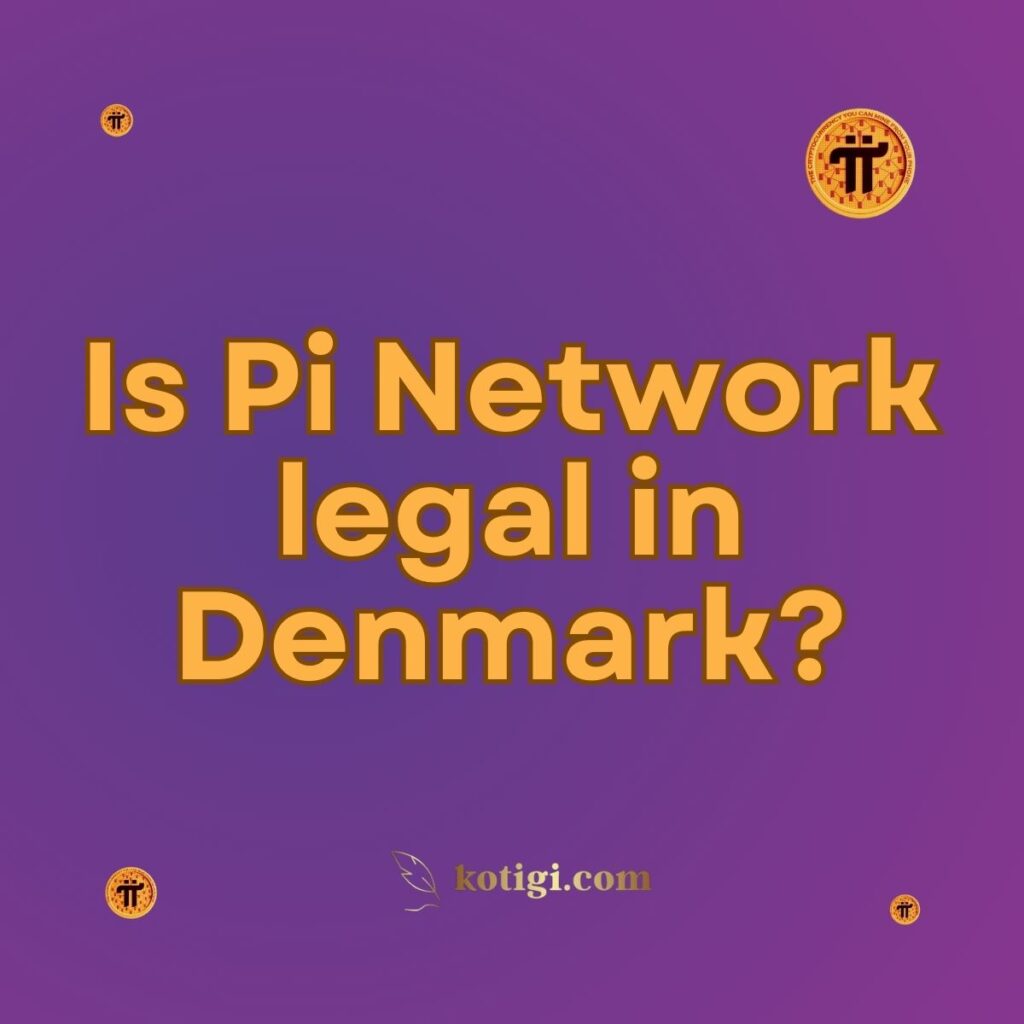
Is Pi Network legal in Denmark?
Pi Network operates in a legal gray area in Denmark, as the country currently lacks specific cryptocurrency regulations. While Denmark has not imposed any direct bans on Pi Network, users should be aware that Denmark’s financial regulators are closely monitoring the digital currency space. Therefore, Danish users can participate in Pi Network, but they should remain cautious and stay updated on any potential regulatory changes in the future.
Introduction
With the increasing global interest in cryptocurrency platforms like Pi Network, users in Denmark might be curious about the legality of participating in this emerging network. Pi Network offers users a novel way to mine cryptocurrency via mobile devices, but the lack of specific cryptocurrency regulations in Denmark can create uncertainty for potential participants. In this article, we will explore the legal status of Pi Network in Denmark, Denmark’s approach to cryptocurrency regulation, and the potential risks and opportunities for users who engage with Pi Network in the country.
1. Cryptocurrency Regulations in Denmark
1.1 Current Legal Framework for Cryptocurrencies
Denmark, like many other countries in the European Union, does not yet have a comprehensive legal framework specifically designed for cryptocurrencies. However, this does not mean that platforms like Pi Network are banned in the country. Denmark has taken a somewhat neutral stance on cryptocurrency, allowing its citizens to engage with digital assets without direct restrictions, as long as these activities do not violate existing financial laws.
1.2 The Danish Financial Supervisory Authority’s Stance on Cryptocurrencies
Denmark’s Financial Supervisory Authority (FSA), or Finanstilsynet, has issued guidelines and warnings related to cryptocurrencies, advising caution due to the volatile nature of these assets. The FSA has emphasized that cryptocurrency trading and mining platforms are not regulated financial services in Denmark, which means that users engaging with these platforms, including Pi Network, do so at their own risk. While the FSA does not explicitly prohibit the use of cryptocurrencies, it encourages individuals to be vigilant about fraud and the potential risks associated with unregulated platforms.
1.3 Absence of Specific Cryptocurrency Laws
At present, Denmark does not have laws that directly govern platforms like Pi Network. This lack of regulatory clarity leaves room for legal ambiguity. While there is no formal ban on Pi Network or other cryptocurrency platforms, users should remain aware that new legislation could be introduced as the Danish government continues to evaluate the role of digital currencies in its economy.
2. Compliance with Financial Laws in Denmark
2.1 Anti-Money Laundering (AML) Regulations
Denmark is known for its strict Anti-Money Laundering (AML) laws, and any platform dealing with financial transactions must comply with these regulations. Since Pi Network does not yet enable monetary transactions, it currently falls outside the scope of Denmark’s AML laws. However, if Pi Network introduces features allowing users to trade or exchange Pi tokens for fiat or other cryptocurrencies, it may be subject to Denmark’s AML requirements, and users would need to comply with these rules to avoid potential legal consequences.
2.2 Taxation on Cryptocurrency in Denmark
Although Pi tokens are not currently tradable, Danish users should be aware that cryptocurrency earnings, once they are monetized, could be subject to taxation. Denmark’s tax authorities consider cryptocurrencies as taxable assets, and any profits made from trading or mining digital currencies must be reported. While Pi Network is still in its development phase, users should be prepared to report future earnings to the Danish Tax Agency (Skattestyrelsen) once the Pi token gains monetary value.
2.3 Consumer Protection Concerns
The Danish FSA has emphasized that platforms like Pi Network are not covered by the same consumer protection laws that apply to traditional financial services. This means that Danish users engaging with Pi Network are taking on risks without the safety net of legal protections. If users encounter issues such as fraud, loss of tokens, or other disputes, there may be little legal recourse for them under current Danish law.
3. Risks and Opportunities for Pi Network Users in Denmark
3.1 Regulatory Uncertainty
While Pi Network is not banned in Denmark, the regulatory uncertainty surrounding its operation presents some risks. Users should keep in mind that future regulatory changes could impose restrictions on Pi Network or similar platforms. It is essential to stay updated on any developments in Denmark’s cryptocurrency legislation to avoid potential legal issues.
3.2 Opportunities in a Crypto-Friendly Environment
Despite the absence of specific regulations, Denmark is considered one of the more crypto-friendly countries in Europe. Danish users can explore Pi Network’s potential without the same level of scrutiny faced in more restrictive environments. The platform’s mobile-based mining model offers a unique opportunity for individuals who are curious about cryptocurrency but do not want to invest in expensive mining equipment.
3.3 Volatility and Security Risks
As with all cryptocurrency platforms, Pi Network users in Denmark should be aware of the potential for market volatility once the Pi token becomes tradable. Additionally, given that Pi Network is still in its development phase, there are security risks to consider, including the possibility of scams or hacking attempts targeting users’ accounts. Without strong consumer protections in place, Danish users may find it difficult to recover lost funds or resolve disputes.
4. Pi Network’s Role in Denmark’s Financial Landscape
4.1 Supporting Digital Innovation
Denmark has positioned itself as a hub for digital innovation, and Pi Network’s blockchain-based model aligns with the country’s focus on technological advancement. As Denmark continues to explore the potential of blockchain technology, platforms like Pi Network could play a role in encouraging further digital innovation and entrepreneurship.
4.2 Potential for Economic Impact
Cryptocurrencies have the potential to contribute to economic growth, and Pi Network could be part of this trend in Denmark. By providing a decentralized platform for users to engage with blockchain technology, Pi Network may encourage more Danish individuals and businesses to explore digital assets. However, the platform’s ultimate impact on Denmark’s economy will depend on how it navigates the regulatory landscape and whether it can gain widespread adoption.
4.3 Integration with Denmark’s Financial Ecosystem
For Pi Network to thrive in Denmark, it will need to integrate seamlessly with the country’s financial ecosystem. This could involve compliance with future cryptocurrency regulations, adherence to AML standards, and ensuring that users have access to secure and reliable platforms for managing their Pi tokens. Collaboration with financial regulators and industry stakeholders could help Pi Network gain credibility in Denmark’s financial landscape.
5. How Pi Network Can Adapt to the Danish Regulatory Environment
5.1 Engaging with Regulators
To ensure its long-term success in Denmark, Pi Network could benefit from engaging proactively with the Danish FSA and other regulatory bodies. By collaborating with policymakers, the platform may be able to address concerns about consumer protection, financial stability, and the risks associated with digital currencies. Early engagement with regulators could help Pi Network navigate future regulatory changes and build trust with Danish users.
5.2 Educating Users on Compliance
As Denmark’s cryptocurrency regulations evolve, Pi Network will need to educate its users on how to comply with local laws, including tax reporting requirements and potential AML obligations. By providing resources and guidance on these topics, Pi Network can help ensure that its Danish users are informed and prepared to meet any legal requirements that may arise.
5.3 Enhancing Security Measures
Given the risks associated with unregulated cryptocurrency platforms, Pi Network should prioritize enhancing its security measures to protect users’ accounts and data. By implementing strong encryption protocols, two-factor authentication, and other security features, the platform can build trust with Danish users and reduce the likelihood of security breaches or fraud.
Conclusion
Pi Network is currently operating in a legal gray area in Denmark, where there are no specific laws governing its use, but also no direct bans. The Danish FSA has expressed caution about cryptocurrencies and encourages users to be aware of the risks associated with unregulated platforms like Pi Network. While users in Denmark can participate in Pi Network, they should stay informed about potential regulatory changes that could impact their ability to engage with the platform in the future. By understanding the current legal environment and taking steps to comply with financial laws, Danish users can safely explore the opportunities presented by Pi Network.
Key Takeaways
- Pi Network is legal in Denmark, but the country has no specific regulations governing its use.
- The Danish Financial Supervisory Authority encourages caution when using unregulated cryptocurrency platforms like Pi Network.
- Users in Denmark should be aware of potential regulatory changes that could impact their ability to participate in Pi Network in the future.
- Cryptocurrency earnings are taxable in Denmark, and users should be prepared to report future profits made from Pi tokens.
- Pi Network can benefit from engaging with regulators to ensure its long-term success in Denmark’s evolving cryptocurrency landscape.





